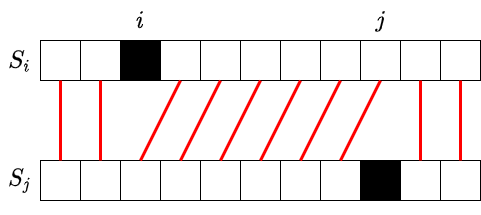Hướng dẫn giải của Bedao Regular Contest 13 - DELCHAR
Chỉ dùng lời giải này khi không có ý tưởng, và đừng copy-paste code từ lời giải này. Hãy tôn trọng người ra đề và người viết lời giải.
Nộp một lời giải chính thức trước khi tự giải là một hành động có thể bị ban.
Nộp một lời giải chính thức trước khi tự giải là một hành động có thể bị ban.
Tác giả:
Khi nào thì ~t_i = t_j~?

Dựa vào hình vẽ trên, ta thấy:
- Với ~1 \le p < i~, ta có: ~t_i[p] = t_j[p] = s[p]~.
- Với ~i \le k < j~, ta có: ~t_i[p] = s[p + 1]~, ~t_j[p] = s[p]~.
- Với ~j \le p < n~, ta có: ~t_i[p] = t_j[p] = s[p + 1]~.
Vì vậy, ~t_i = t_j~ khi và chỉ khi ~s[i] = s[i + 1] = \ldots = s[j]~.
Để đếm số cặp số ~(i, j)~ thỏa điều kiện này, có rất nhiều cách khác nhau: ta có thể tách xâu ~s~ ban đầu thành các đoạn liên tiếp có ký tự giống nhau. Với một đoạn ký tự độ dài ~k~, ta sẽ tìm được ~\frac{k(k - 1)}{2}~ cặp số ~(i, j)~ thỏa mãn.
Độ phức tạp: ~O(|s|)~.
Code mẫu
#include <bits/stdc++.h> using namespace std; void solve() { int n; cin >> n; string s; cin >> s; long long ans = 0; for (int i = 0, j = 0; i < n; i = j) { while (j < n && s[i] == s[j]) j++; ans += 1LL * (j - i) * (j - i - 1) / 2; } cout << ans << '\n'; } int main() { ios::sync_with_stdio(false); cin.tie(NULL); solve(); }

Bình luận